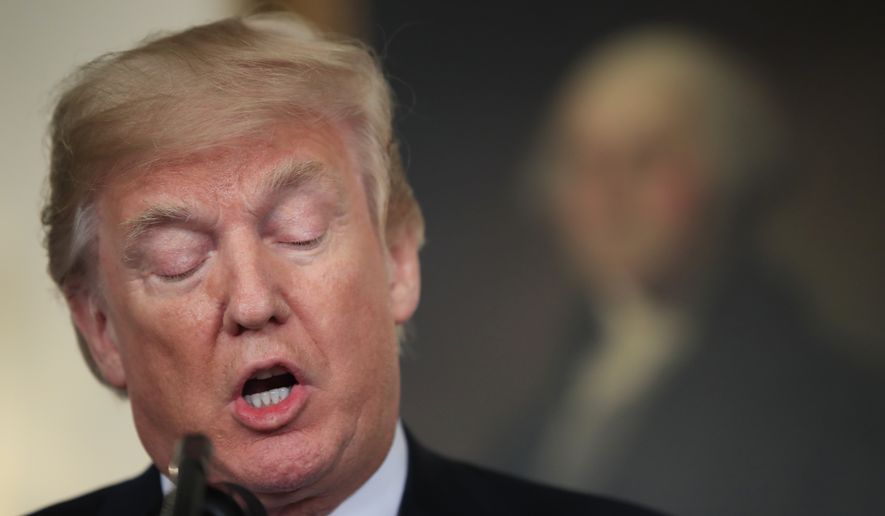After 14 months of fighting the swamp in Washington, President Trump said Friday the swamp forced him to sign a $1.3 trillion spending bill.
Casting himself as the same outsider who campaigned for office two years ago, Mr. Trump professed his disgust for the standard, last-minute bipartisan dealmaking that led to the 2,232-page “omnibus” bill stacked on a table next to him.
“There are a lot of things that I’m unhappy about in this bill,” the president said at the White House. “There are a lot of things that we shouldn’t have had in this bill, but we were in a sense forced, if we wanted to build our military, we were forced to have.”
He did the presidential equivalent of stomping his feet in defiance.
“I say to Congress: I will never sign another bill like this again. I’m not going to do it again,” Mr. Trump said.
Then he signed the bill.
SEE ALSO: Trump signs $1.3 trillion spending bill but vows ‘never again’
The measure includes $654 billion for defense, an increase of $80 billion over last year — exactly what the president wanted. But to get Democrats’ support, Mr. Trump and his Republican allies in Congress also agreed to boost domestic spending by 12 percent, an increase of $63 billion over last year.
It includes everything from a 30 percent increase on infrastructure spending to increases of $3 million each for the National Endowments for the Arts and Humanities, programs totaling about $153 million each that Mr. Trump had wanted to eliminate.
“We’re very disappointed that in order to fund the military we had to give up things where we consider in many cases them to be bad or them to be a waste of money,” the president said. “But that’s the way unfortunately right now this system works.”
Democrats were gleeful about the result of their negotiations with the president who wrote “The Art of the Deal.” Senate Minority Leader Charles E. Schumer of New York said Democrats are “really happy” with funding increases for education, infrastructure, opioid programs and many of their other priorities.
“As the minority party, we feel good about being able to succeed in so many ways,” Mr. Schumer said. “We don’t have the House. We don’t have the Senate. We don’t have the presidency. But we produced a darn good bill for the priorities that we have believed in.”
The president bitterly criticized the spending process that Congress has perfected over decades: procrastinating for months, reaching a deal immediately before a deadline, and filing a mammoth bill that nobody can possibly read before a final vote.
“It’s always been a problem for our country,” Mr. Trump said. “They get together and create a series of documents that no one’s been able to read because it was just done. Nobody read it. It’s only hours old.”
That’s usually what the losing side says.
The man who made a campaign promise to wipe out the nation’s debt in eight years sputtered that the spending bill was “the second-largest ever.”
“President Obama signed one that was actually larger which I’m sure he wasn’t too happy with, either,” Mr. Trump said.
The spending deal will increase the deficit for the current fiscal year to at least $850 billion, up from $666 billion in fiscal 2017. Starting in October, annual deficits are projected to top $1 trillion for the foreseeable future. On that course, the government would add roughly $12 trillion in borrowing over the next decade.
The president said Congress should change its rules to stop the spending madness.
“We have to get rid of the filibuster rule and go to 51 votes in the Senate if we’re going to have really sustained, continued success,” Mr. Trump said. “To prevent the omnibus situation from ever happening again, I’m calling on Congress to give me a line-item veto for all government spending bills, and the Senate must end the filibuster rule and get down to work.”
There’s limited support in his own party, let alone among Democrats, for ending the filibuster. The Supreme Court ruled the line-item veto unconstitutional in 1998.
In the end, the president said, rebuilding the military was more important than the added wasteful spending.
“I looked very seriously at the veto,” he told reporters. “But because of the incredible gains that we’ve been able to make for the military, that overrode any of our thinking.”
• Dave Boyer can be reached at dboyer@washingtontimes.com.




Please read our comment policy before commenting.